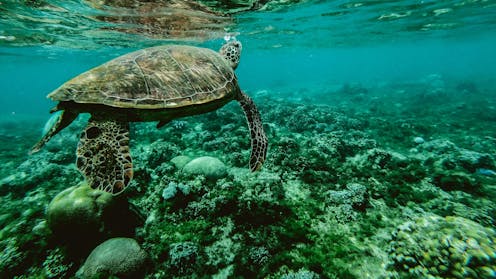
Going "green" is not just good for the environment and climate, it can also be great for business. Consumers increasingly demand eco-friendly goods and services, and are willing to pay more for them.
Author
- Riona Moodley
Lecturer in Law, UNSW Institute for Climate Risk and Response, UNSW Sydney
But consumers aren't always getting what they paid for - as evidenced by a number of high-profile "greenwashing" legal cases in Australia.
Greenwashing occurs when a business falsely markets its products and services as sustainable or good for the environment or climate. It is a form of misleading and deceptive conduct, and considered illegal under various Australian laws .
So, let's take a look at the array of products and services involved in recent greenwashing claims, and how to avoid getting duped.
1. Garbage bags
In April this year, the Federal Court fined Clorox Australia A$8.25 million after finding the company falsely claimed its GLAD-branded kitchen and garbage bags contained "50% ocean plastic".
The court found the bags were partly made from plastic collected from communities in Indonesia up to 50 kilometres from a shoreline, and not from the ocean or sea.
2. Superannuation
The Federal Court fined superannuation trustee, Mercer Superannuation (Australia) Limited, $11.3 million in August last year after it admitted to making misleading statements about its "Sustainable Plus" investment options.
The products were promoted as excluding investments in companies involved in the fossil fuel, gambling and alcohol industries. These representations were found to be false and misleading since the products did, in fact, include investments in each of those industries.
In March this year, the Federal Court found Active Super trustee LGSS made false and misleading statements about its ESG (environmental, social and governance) credentials. It imposed a $10.5 million penalty.
LGSS claimed the Active Super fund had eliminated investments risky to the environment and the community, including coal mining and oil tar sands. The claims were found to be untrue. In fact, LGSS held investments in various coal and oil companies, including Whitehaven Coal.
3. Ethical investment
In March last year, the Federal Court found investment giant Vanguard misled investors by claiming its $1 billion ethical bond fund would exclude certain fossil fuel investments.
The fund had, in fact, invested in activities associated with oil and gas exploration , including oil pipelines in the United States and Abu Dhabi and a petroleum company in Chile. Vanguard was fined $12.9 million.
4. Sunscreen
The ACCC has launched legal action against Edgewell Personal Care Australia (and its US-based parent company) over their Hawaiian Tropic and Banana Boat sunscreens.
Edgewell has claimed the sunscreens are "reef friendly" because they do not contain oxybenzone or octinoxate - chemicals banned in some countries due to the damage they cause to coral reefs.
But the ACCC claims the sunscreens contain other ingredients which either cause, or risk causing, harm to reefs. It says Edgewell has no reasonable or scientific basis to promote the environmental benefits of Hawaiian Tropic and Banana Boat sunscreens.
The manufacturer is contesting the ACCC's allegations. An Edgewell spokesperson, quoted in The Guardian , said the company firmly stood by the products' claims.
5. Carbon offsets
In May this year, EnergyAustralia reached a settlement with non-profit group Parents for Climate, which accused the energy giant of greenwashing its "Go Neutral" carbon offset product.
Under the scheme, EnergyAustralia sold energy sourced primarily from fossil fuels, while promising to "offset" related emissions by buying carbon credits .
Parents for Climate claimed customers were falsely led to believe their energy use under the scheme would not contribute to climate change.
As part of the settlement, EnergyAustralia apologised to customers for not being clear and acknowledged that "offsets do not prevent or undo the harms caused by burning fossil fuels for a customer's energy use".
How to spot greenwashing
While greenwashing litigation is helping to reshape corporate behaviour, consumers have an important role, too.
ASIC and the ACCC have issued guidelines to help businesses avoid greenwashing. Those resources are also useful for consumers.
First, beware vague, unsubstantiated labels such as eco-friendly, green or sustainable. As the ACCC's guidelines observe, "without further qualification or clarification, consumers can easily be misled that the product, service or business is better for the environment than is actually the case".
If vague words are used without explanation, concerned consumers should ask the company for clarification and evidence.
Watch out for businesses making selective claims about a product's benefits while hiding its negative attributes.
For example, a clothing manufacturer might claim its new product line is "eco-friendly" because it uses recycled polyesters. But it might fail to acknowledge the negative environmental impact of water use when dyeing the products or emissions involved in transporting them to consumers.
To avoid this trap, investigate the brand's history . Has it found to have been greenwashing in the past? Is it transparent about where it sources its materials or how the products are made?
And what about financial products? If a firm hasn't provided adequate information about its sustainability claims, ask for verification.
You can also compare the environmental performance of a product with industry peers .
By learning how to make more informed choices, consumers can drive change through their purchasing power.
![]()
Riona Moodley does not work for, consult, own shares in or receive funding from any company or organisation that would benefit from this article, and has disclosed no relevant affiliations beyond their academic appointment.






